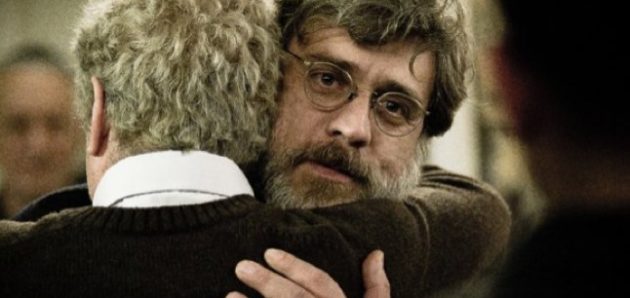REVIEW: Israeli Comedy-Drama Footnote Makes Talmudic Scholarship Seem Almost Dynamic

Sometimes a movie demands attention more for its “How” than its “What,” and writer-director Joseph Cedar’s Footnote falls squarely in that category. A movie about feuding father-and-son Talmudic scholars isn’t a surefire way to pack ’em in at the box office. But Cedar approaches his subject with so much wit and verve that he almost – almost – makes you forget you’re watching a movie about a very small, cloistered subset of academic obsessives whose life’s work is about as visually undynamic as you can imagine. How do you get action and drama out of pages and pages filled with Hebrew lettering?
Somehow Cedar – who was born in New York but who has lived in Jerusalem since the age of 5 – pulls it off. Footnote was the Israeli Academy Award nominee for 2011; it lost to Asghar Farhadi’s A Separation, which provided the bullying Iranian government with an unfortunate opportunity to declare artistic supremacy (in addition to every other kind) over Israel. But while Footnote is a very different movie – it doesn’t pack the emotional charge that A Separation does – its craftsmanship is exceptional. Cedar has made a picture about scholarly obsession that really moves, even when its characters – who spend a lot of time at their desks, surrounded by piles of papers and books adorned with wrinkled sticky-note flags – don’t.
Eliezer Shkolnik (Shlomo Bar-Aba) has spent years, practically a lifetime, analyzing various versions of the Talmud, getting deep into minute differences in wording and phrasing. He makes a big research breakthrough, but just as he’s about to announce it, a rival professor (played by Micah Lewensohn) scoops him. Eliezer, an uncommunicative and taciturn sort, retreats deeper into his research, hoping that one day he’ll be appreciated and awarded the coveted Israel Prize. Meanwhile his son, Uriel (Lior Ashkenazi), also a Talmudic scholar, surpasses his father in both the respect and likability departments – he’s more of a born star, and he certainly likes the limelight. When it’s announced, finally, that Eliezer has been chosen for the Israel Prize, Uriel is relieved and happy for his father – until he learns exactly what Eliezer’s achievement will cost him, both professionally and personally. Between Uriel’s outright ambition and Eliezer’s naked need for recognition and respect, the relationship between father and son – which was never, it’s suggested, particularly warm to begin with – becomes increasingly tense.
Cedar has cleverly organized his movie into chapter-like sections that somehow make analyzing reams of ancient text seem like an adventure, or at least something worth devoting your life to. He uses some lively effects, most of which are quite simple: He suggests the feverishness of scholarly devotion, for example, by showing sheafs of text whizzing across the frame, accompanied by the appropriate whooshing sound effects. The picture has a surprising agility, considering it really is about two guys with furrowed brows whose heads are generally buried in books.
There is still the fact, though, that scholarship is just never going to be the jazziest subject on the planet, and even Cedar seems to know it. In places, Footnote strains to delineate the tension between father and son, re-embroidering their conflicts over and over again, long after we’ve gotten the point. Cedar – who previously made the 2007 Israeli war drama Beaufort – has taken great pains to add lots of emotional dappling and texture to this story, though in the end, what we take away from the relationship between these two characters is pretty simple: They’re victims of your garden variety criss-crossing jealousy and resentment. Still, the actors keep the drama believable and engaging: Bar-Aba, in particular, pulls off the tricky feat of making an impenetrable character sympathetic, albeit in a maddening, “Would it kill you to crack a smile?” way. And both Bar-Aba and Ashkenazi comfortably navigate the dry comic touches Cedar has added to the story: We don’t know whether to wince or laugh when, early in the film, Uriel publicly praises his father with a long-winded, backhanded story that essentially makes the guy sound like an uncommunicative jerk.
Then again, that's what he is. What Cedar captures here is the way a father and son can be bound so tightly they almost choke the air out of one another. You can’t exactly call it affection; it’s that far more complicated thing we call kinship.
Follow Stephanie Zacharek on Twitter.
Follow Movieline on Twitter.

Comments
yawn.